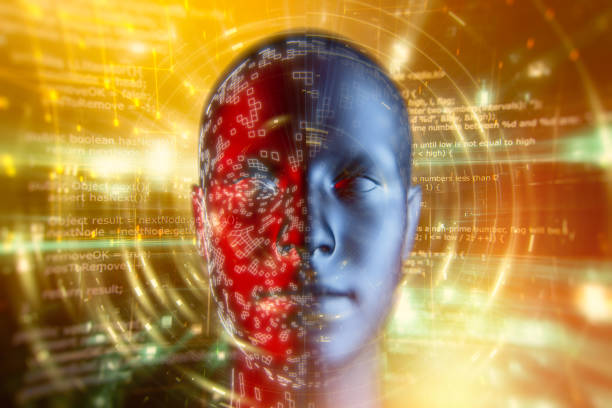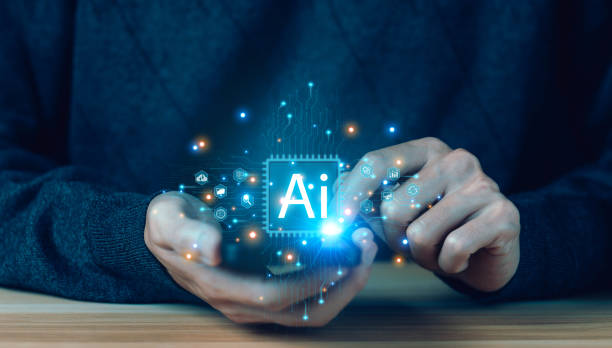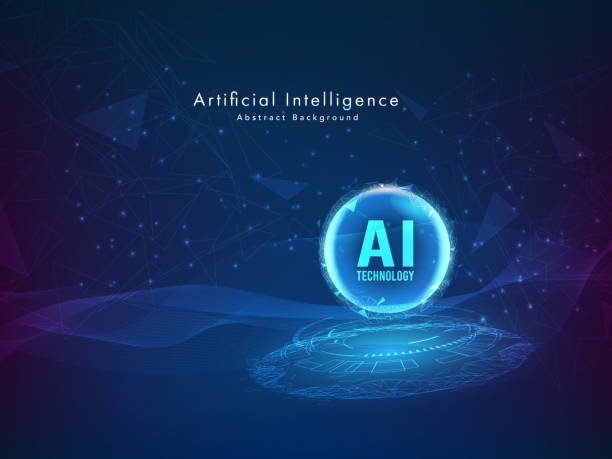What is Artificial Intelligence? Definitions and Fundamental Concepts
#Artificial_Intelligence (AI) is a branch of computer science that seeks to build machines capable of performing tasks that typically require human intelligence.
These tasks include learning, problem-solving, pattern recognition, natural language understanding, and decision-making.
In other words, the goal of #AI is to simulate human intelligence in machines.
There are various definitions of artificial intelligence, but the common thread is the emphasis on the ability of a machine to perform tasks that require thinking and reasoning.
To better understand Artificial Intelligence, we need to become familiar with its fundamental concepts.
These concepts include algorithms, data, machine learning, neural networks, and natural language processing.
Algorithms are a set of instructions that tell the machine how to perform a specific task.
Data is information that the machine uses to learn and make decisions.
Machine learning is a process in which machines learn from data without being explicitly programmed.
Neural networks are models inspired by the structure of the human brain and are used to learn patterns and relationships in data.
Natural language processing helps machines understand and generate human language.
Artificial intelligence is not only a technology but also a broad field of study that will have a profound impact on our lives.
From self-driving cars to medical diagnosis, artificial intelligence is changing the world.
Is your company’s website as professional and reliable as it should be? Create an online presence that reflects your credibility and attracts more customers with a specialized corporate website design by Rasaweb.
✅ Build a powerful and professional image of your brand
✅ Turn visitors into real customers
⚡ Get a free consultation now!
The History of Artificial Intelligence: From Dream to Reality
The history of Artificial Intelligence is a journey full of ups and downs, from early dreams to the realization of today’s amazing achievements.
In the 1950s, with the advent of early computers, hopes for building thinking machines were revived.
Alan Turing, one of the pioneers of this field, proposed a test known as the “Turing Test,” which became a benchmark for measuring the intelligence of machines.
In the following decades, researchers tried to write programs that could solve mathematical problems, play chess, and understand human language.
But these efforts faced many challenges, and the progress of artificial intelligence was slower than expected.
In the 1980s, with the emergence of expert systems, artificial intelligence gained new life.
Expert systems were programs that collected the knowledge of human experts in a specific field and used it to provide advice and make decisions.
But these systems also had limitations and could not completely replace human experts.
In the 2000s, with the increase in computer processing power and access to big data, machine learning emerged as a new approach in artificial intelligence.
Machine learning allows machines to learn from data without being explicitly programmed.
This approach has led to significant advances in areas such as image recognition, speech recognition, and natural language processing.
Today, artificial intelligence is penetrating various aspects of our lives and promises a future full of new possibilities.
Click here to preview your posts with PRO themes ››
Types of Artificial Intelligence: From Expert Systems to Deep Learning
#Artificial_Intelligence can be divided into various types based on different abilities and approaches.
One of these classifications is based on the level of intelligence that machines possess.
Accordingly, artificial intelligence can be divided into three general categories: Narrow AI, General AI, and Super AI.
Narrow AI refers to machines that can only perform a specific task well.
Expert systems are an example of this type of artificial intelligence.
General AI refers to machines that can do anything that a human can do.
Super AI refers to machines that surpass human intelligence and can solve problems that humans cannot solve.
Another classification of artificial intelligence is based on the approaches used to build intelligent machines.
Accordingly, artificial intelligence can be divided into categories such as machine learning, neural networks, natural language processing, and robotics.
Machine learning is an approach that allows machines to learn from data without being explicitly programmed.
Neural networks are models inspired by the structure of the human brain and are used to learn patterns and relationships in data.
Natural language processing helps machines understand and generate human language.
Robotics refers to the design and construction of robots that can perform tasks that usually require humans.
Applications of Artificial Intelligence in Various Industries
Artificial intelligence (AI) is no longer an abstract concept but has become a driving force in various industries.
From healthcare to finance and manufacturing, artificial intelligence is changing the way things are done.
In the healthcare industry, artificial intelligence is used to diagnose diseases, develop drugs, and provide personalized care.
Machine learning algorithms can analyze medical images with high accuracy and detect early signs of diseases.
In the financial industry, artificial intelligence is used to detect fraud, manage risk, and provide automated financial services.
Robo-advisors can help customers with their investments, and trading algorithms can buy and sell stocks with high speed and accuracy.
In the manufacturing industry, artificial intelligence is used to automate processes, improve product quality, and reduce costs.
Industrial robots can perform repetitive and dangerous tasks, and machine vision systems can identify product defects.
In addition to these industries, artificial intelligence has many applications in other areas such as transportation, education, and entertainment.
Self-driving cars, intelligent educational systems, and intelligent video games are examples of the applications of artificial intelligence in these areas.
With the increasing progress of artificial intelligence, it is expected that its applications in various industries will expand and create significant transformations in our lives.
Are you dissatisfied with the low conversion rate of visitors to customers on your online store?
Solve this problem forever with a professional online store design by Rasaweb!
✅ Increase the conversion rate of visitors to customers
✅ Create an excellent user experience and gain customer trust
⚡ Get a free consultation
Pros and Cons of Artificial Intelligence: A Detailed Examination
Artificial Intelligence (AI), despite its many potentials, has both advantages and disadvantages that need to be carefully examined.
Among the advantages of #AI are increased productivity, reduced errors, improved quality of life, and the creation of new opportunities.
Automation of processes by #AI can lead to increased productivity in various industries.
#AI algorithms can analyze data with high accuracy and reduce human errors.
Artificial intelligence can help improve the quality of life by diagnosing diseases, developing drugs, and providing personalized care.
Also, #AI can create new opportunities in various fields, including creating new jobs and developing new technologies.
However, #AI also has disadvantages that should be considered.
These disadvantages include job losses, security concerns, discrimination, and abuse.
Automation of processes by #AI may lead to job losses in some industries.
#AI systems may be vulnerable to cyber attacks and endanger the personal information of individuals.
#AI algorithms may unintentionally be discriminatory and exhibit unfair behaviors.
Also, #AI may be used for abusive purposes, such as creating fake news and manipulating elections.
To benefit from the advantages of #AI and reduce its disadvantages, it is necessary to develop and implement appropriate policies and regulations in this area.
Click here to preview your posts with PRO themes ››
Ethical Challenges of Artificial Intelligence and Solutions to Address Them
Artificial intelligence (AI), with its increasing progress, also brings new ethical challenges that require careful consideration and finding appropriate solutions to address them.
One of these challenges is the discussion of accountability for the decisions and actions of intelligent machines.
If a self-driving car causes an accident, who will be responsible? The car manufacturer, the algorithm programmer, or the machine itself? Another challenge is the discussion of discrimination in artificial intelligence algorithms.
Algorithms are trained on data that may contain biases and prejudices present in society.
These prejudices can lead to unfair decisions by intelligent machines.
The third challenge is the discussion of protecting the privacy of individuals.
Artificial intelligence systems can collect and analyze a large amount of personal data of individuals.
This data can be used for abusive purposes and endanger the privacy of individuals.
To address these ethical challenges, it is necessary to adopt a multifaceted approach.
This approach should include the development of appropriate laws and regulations, the development of ethical standards, education and public awareness, and the creation of oversight mechanisms.
Also, it is necessary for researchers and developers of artificial intelligence to pay special attention to ethical issues and try to design algorithms that are fair, transparent, and reliable.
The Future of Artificial Intelligence: What to Expect
The future of Artificial Intelligence (AI) is full of possibilities and tremendous transformations.
With the increasing progress of technology, it is expected that artificial intelligence will penetrate more aspects of our lives and create profound changes.
In the future, we will see more advanced self-driving cars that can completely replace human drivers.
Intelligent educational systems can help students learn in a personalized way and develop their talents.
Surgical robots can perform complex surgeries with high precision and delicacy.
Also, artificial intelligence can play an important role in solving major global challenges such as climate change, hunger, and disease.
However, the future of artificial intelligence is also associated with challenges.
These challenges include job losses, security concerns, and ethical issues.
To address these challenges, it is necessary to develop and implement appropriate policies and regulations in this area.
Also, it is necessary for researchers and developers of artificial intelligence to pay special attention to ethical issues and try to develop technologies that benefit humanity.
| Field | Applications of Artificial Intelligence |
|---|---|
| Healthcare | Disease diagnosis, drug development, personalized care |
| Finance | Fraud detection, risk management, automated financial services |
| Manufacturing | Process automation, quality improvement, cost reduction |
| Transportation | Self-driving cars, traffic management |
| Education | Intelligent educational systems, personalized learning |
Artificial Intelligence and its Impact on the Labor Market
Artificial intelligence (AI) is increasingly changing the landscape of the labor market and has widespread effects on various industries and occupations.
Automation of processes by #AI can lead to increased productivity and reduced costs, but at the same time, it may cause job losses in some industries.
Jobs that involve repetitive and routine tasks are more at risk of automation.
On the other hand, #AI can also create new job opportunities.
The development, implementation, and maintenance of #AI systems require skilled specialists who are specialized in areas such as machine learning, data mining, and programming.
Also, #AI can help create new jobs in areas such as data analysis, user experience design, and organizational change management.
In order for individuals to succeed in the labor market of the future, it is necessary to keep their skills up-to-date and learn new skills.
Skills such as critical thinking, problem-solving, creativity, and collaboration will become more important.
Also, familiarity with #AI and how to use it can help individuals to be more successful in their jobs.
Governments and educational organizations also have an important role to play in preparing individuals for the labor market of the future.
They need to develop and implement appropriate training programs that help individuals acquire the skills needed to succeed in the world of #AI.
Is your company’s website as professional and reliable as it should be? Create an online presence that reflects your credibility and attracts more customers with a specialized corporate website design by Rasaweb.
✅ Build a powerful and professional image of your brand
✅ Turn visitors into real customers
⚡ Get a free consultation now!
Artificial Intelligence Learning Resources for Beginners and Experts
Learning Artificial Intelligence (AI) can be an exciting and rewarding journey, but it requires access to appropriate educational resources.
Fortunately, many resources are available for learning artificial intelligence, including online courses, books, scientific articles, blogs, and specialized forums.
For beginners, online courses can be a great starting point.
Platforms such as Coursera, edX, and Udacity offer introductory artificial intelligence courses that teach basic concepts in a simple and understandable language.
Books can also be valuable resources for learning artificial intelligence.
Books such as “Artificial Intelligence A Modern Approach” and “Pattern Recognition and Machine Learning” are among the reference books in this field.
For experts, scientific articles and specialized conferences can be good resources for staying up-to-date with the latest advances and achievements in the field of artificial intelligence.
Blogs and specialized forums can also provide opportunities to learn from the experiences of others and exchange views with experts.
| Resource Type | Examples | Level |
|---|---|---|
| Online Courses | Coursera, edX, Udacity | Beginner to Advanced |
| Books | Artificial Intelligence A Modern Approach, Pattern Recognition and Machine Learning | Beginner to Advanced |
| Scientific Articles | arXiv, IEEE Xplore | Expert |
| Blogs | Towards Data Science, Machine Learning Mastery | Beginner to Expert |
| Forums | Stack Overflow, Reddit (r/MachineLearning) | Beginner to Expert |
Summary and a Look at the Future of Artificial Intelligence in Iran
Artificial Intelligence (AI) as a transformative technology has a high potential for creating positive changes in Iran.
Given the abundant talents and resources available in the country, Iran can become one of the pioneers of artificial intelligence in the region.
The Iranian government has also realized the importance of artificial intelligence and has started efforts to support the development of this technology in the country.
Developing the national artificial intelligence document, creating research centers, and supporting knowledge-based companies active in this field are among these measures.
However, there are also challenges on the path to the development of artificial intelligence in Iran.
The shortage of skilled specialists, limited access to big data, and the lack of appropriate infrastructure are among these challenges.
To overcome these challenges, it is necessary to strengthen cooperation between universities, industry, and government.
Also, it is necessary to invest more in education and training of specialized human resources in the field of artificial intelligence.
Given the high potential of artificial intelligence for creating added value in various industries, the development of this technology can contribute to economic growth and improve the quality of life in Iran.
Therefore, it is necessary to make more efforts to develop artificial intelligence in the country and use this technology to solve the existing challenges in society.
FAQ
| Question | Answer |
|---|---|
| 1. What is Artificial Intelligence (AI)? | It is a branch of computer science that aims to create machines capable of simulating human intelligence and performing tasks that require human thinking, such as learning, problem-solving, and decision-making. |
| 2. What are the main types of artificial intelligence? | It can be classified into Weak AI (Narrow AI) that focuses on a specific task, General AI that possesses comprehensive human capabilities, and Super AI that surpasses human intelligence. |
| 3. Mention some common applications of artificial intelligence in our daily lives. | These include voice assistants (such as Siri and Alexa), recommendation systems (such as Netflix and Amazon), self-driving cars, facial recognition systems, and spam filters. |
| 4. What is the difference between Artificial Intelligence and Machine Learning? | Artificial intelligence is the broader concept of creating intelligent machines, while machine learning is a subset of artificial intelligence that focuses on enabling systems to learn from data without explicit programming. |
| 5. What is Deep Learning? | It is a subset of machine learning that uses multi-layered artificial neural networks (deep neural networks) to process data and discover complex patterns, and it is used in image and speech recognition. |
| 6. What are the most prominent benefits of artificial intelligence? | Improving efficiency and productivity, automating repetitive tasks, making better decisions based on big data analysis, and developing solutions to complex problems in areas such as medicine and science. |
| 7. What are the main challenges facing the development and deployment of artificial intelligence? | These include the need for vast amounts of high-quality data, privacy and security issues, bias in data and algorithms, and high development and maintenance costs. |
| 8. Does artificial intelligence raise ethical or social concerns? | Yes, it raises concerns about privacy, algorithmic bias, job losses due to automation, responsibility for errors committed by intelligent systems, and the need for a regulatory framework. |
| 9. How can artificial intelligence affect the future of the labor market? | It can lead to the automation of some routine jobs, but it will also create new jobs that require advanced skills in developing, operating, and maintaining artificial intelligence systems. |
| 10. What are some modern or promising technologies in the field of artificial intelligence? | These include advanced natural language processing (NLP) (such as large language models like ChatGPT), computer vision, robotics, and generative AI. |
And other services of Rasa Web Advertising Agency in the field of advertising
Smart Marketing Automation: A fast and efficient solution to increase sales by focusing on attractive user interface design.
Smart Google Ads: An effective tool to attract customers by managing Google ads.
Smart Direct Marketing: A combination of creativity and technology to attract customers through SEO-driven content strategy.
Smart Social Media: An effective tool to increase sales by using real data.
Smart Reportage: A novel service to increase customer attraction through dedicated programming.
And more than hundreds of other services in the field of internet advertising, advertising consulting, and organizational solutions
Internet Advertising | Advertising Strategy | Advertorials
Resources
What is Artificial Intelligence and How Does it Work?
,How Will Artificial Intelligence Affect the Healthcare Sector?
,Is Artificial Intelligence Causing Job Losses?
,What is Artificial Intelligence and What are its Applications?
? Transform your business in the digital world with Rasaweb Afrin. From secure and professional website design to targeted SEO and content marketing, we offer comprehensive solutions for your success.
📍 Tehran, Mirdamad Street, next to the Central Bank, South Kazerun Alley, Ramin Alley No. 6
“`













